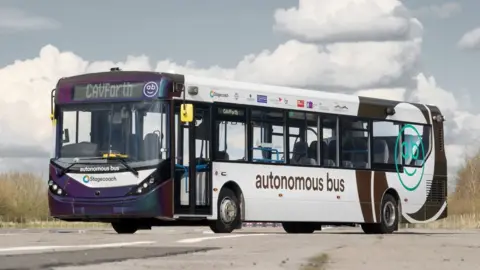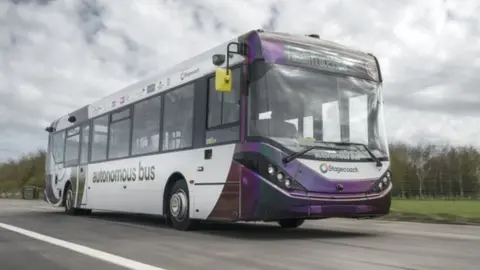First full-size driverless bus trials to begin in Scotland
 Fusion Processing
Fusion ProcessingThe UK's first full-sized driverless buses will begin trials in Scotland this week with a view to having passengers on board later this summer.
Road testing of the autonomous single-decker vehicles gets under way on a 14-mile route between Edinburgh and Fife.
The two-week trial, on a route that crosses the Forth Road Bridge, is the latest in a series held in the UK.
A driver will still be on the bus as a back-up initially for passenger safety and to comply with UK legislation.
It follows previous trials of smaller, shuttle buses in London, Cambridge and Birmingham, while another driverless bus pilot is also due to start in Inverness later this year.
The CAVForth project was initially scheduled to begin in 2019 but was delayed as the Covid pandemic hit with a knock-on effect on the supply chain.
It will see five single-deck buses operating between Ferrytoll Park and Ride in Fife and the Edinburgh Park Train and Tram interchange.
The buses are fitted with sensor and control technology which allows them to run on pre-selected roads without the safety driver having to intervene or take control.
"For the moment there is a legal requirement to have somebody behind the wheel at all times, so we will definitely have a driver in the cab to monitor the system and be able to take over if needed, although that shouldn't be the case," the project's manager Louise Simpson told the BBC's Good Morning Scotland programme.
"We will also have a second member of staff on board in the saloon with the passengers, offering reassurance and a more personal customer service experience for them."
If all goes to plan, the buses could soon provide a service carrying up to 36 passengers across the bridge, with capacity for over 10,000 passengers a week.
Until legislation changes, there will always be a safety driver, but Ms Simpson hopes the law will "eventually be signed off" so drivers don't need to be in the cab and can focus on a secondary role interacting with passengers.
Bus operator Stagecoach has partnered with Fusion Processing, manufacturer Alexander Dennis and Transport Scotland for the UK government-funded project.
It has already held successful depot-based trials, track testing and virtual simulation to fine tune the autonomous drive systems.
'Improvement in safety'
Ms Simpson told BBC Scotland the main benefit of the scheme would be improved safety.
"It is estimated that over 90% of road traffic accidents are down to human error," she said.
"There is always a limit to what any human can see and anticipate whereas these vehicles will have a 360 degree view of their surroundings with an ability to see further than any human could.
"We hope with the ability to take preventative action to avoid a collision, we will see an improvement in safety.
"But with the driver not being confined to the cab area, they will also have more time to offer a better customer experience without having to operate the vehicle, keep the service to time and the other pressures our drivers currently face."
 PA Media
PA MediaThe buses have six levels of driving automation, with zero to two meaning a driver must constantly supervise and is always driving, while levels three to five allow the vehicle to drive itself.
Able to operate at a SAE (Society of Automotive Engineers) level four, it means no driver attention is required for safety but self-driving is only supported in limited areas or circumstances.
'Exciting milestone'
Sam Greer, regional director of Stagecoach in Scotland, said it was a "hugely exciting project" and a major step towards launching the UK's first full-sized autonomous bus service.
Jim Hutchinson, chief executive of Fusion Processing which has developed the sensor technology, called it "the world's most complex and ambitious autonomous vehicle programme".
"On-road testing is an exciting milestone in the development of autonomous commercial vehicles and we look forward to welcoming passengers onboard in a few months' time," he said.
Trials of a driverless bus are also due to start in Inverness later this year.
The pilot will cover a 2km route linking the Beechwood campus of the city's university with the Inverness Retail and Business Park.
It is expected the shuttle service will be used by students and people working on the site to access the shopping and business areas during the day.
